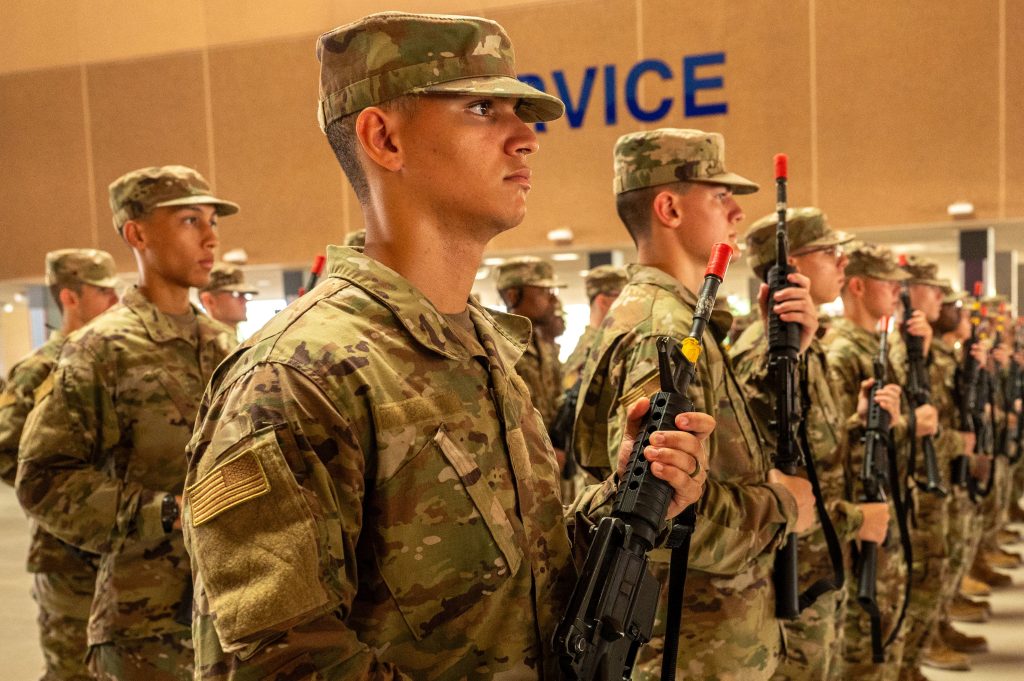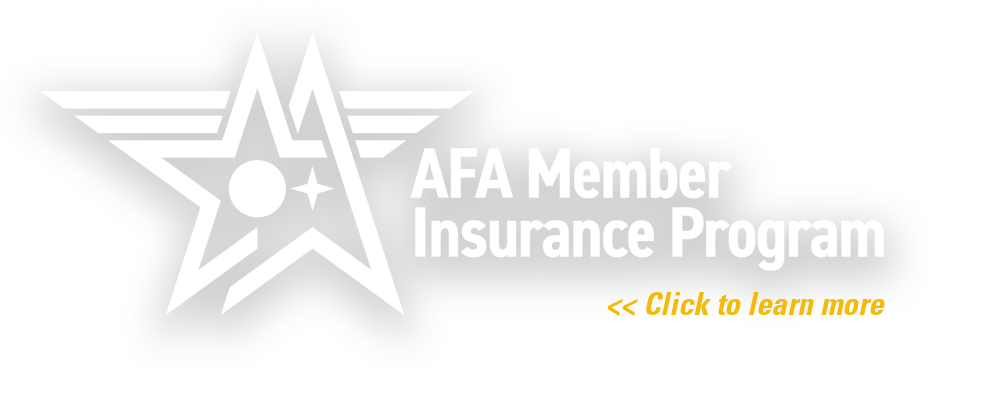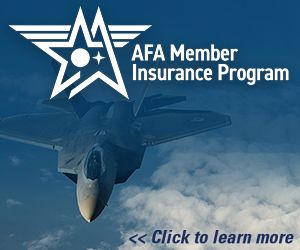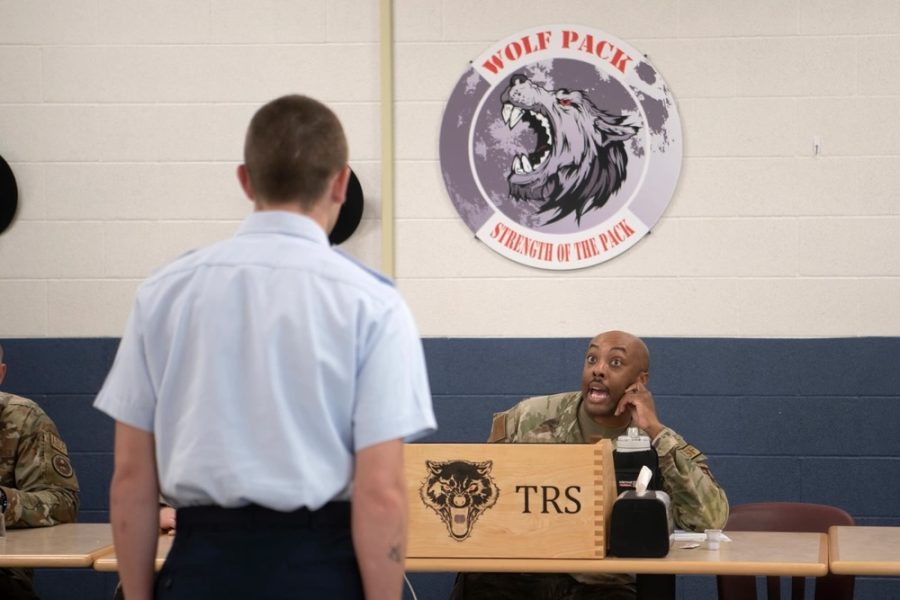A recent social media post alleged that military training instructors at Basic Military Training, the 7.5-week course through which all civilians must pass before becoming Airmen or Guardians, are no longer allowed to yell at trainees during meals, but that is not the case, according to the 37th Training Wing.
While yelling is subjective, “MTIs still put pressure on trainees/Guardians in a tone and tenor that indicates the seriousness of what they are trying to communicate. We call this making corrections,” Vanessa Adame, the wing’s chief of media relations, told Air & Space Forces Magazine.
For the past two years, the standard operating procedure at the dining facility (DFAC) has been to keep such corrections to a minimum and, when necessary, to tone down the intensity at which those corrections are given, so that trainees have 10 full minutes to down the food and fluids they need to stay fueled until the next chow hall.
“When in the dining facility, those corrections are limited to minimal uniform wear corrections, dining hall procedures and safety considerations,” Adame explained. “All other corrections will be accomplished upon exiting the dining facilities. Again, the focus is ensuring trainees/Guardians have a full 10 minutes to eat their meal in order to replenish vital nutrients necessary for mental and physical performance.”
Meanwhile, the “chow runners,” the trainees who lead flights of their colleagues into the DFAC, must still brave the “Snake Pit,” where MTIs readily correct them on their technique.
“Reporting procedures still occur in front of MTIs or as many call it, the ‘Snake Pit.’” Adame said.

On Sept. 18, a post on the popular unofficial Facebook page Air Force amn/nco/snco alleged that Col. Billy Wilson Jr., commander of the 737th Training Group, which oversees BMT at Joint Base San Antonio-Lackland, Texas, issued guidance forbidding yelling in the DFAC except for emergencies or safety issues.
“We are still to make corrections at a normal volume,” the post said, adding that the group commander’s intent “is that the meal times are a ‘mental break.’”
Adame said Wilson recently reiterated the DFAC policy to squadron commanders in a verbal conversation, but there have been no changes to the standard operating procedures.
The DFAC experience at BMT is well-documented: a 2021 YouTube series by the Air Force Recruiting Service shows flights of shaven-headed trainees filing into the DFAC for breakfast. The atmosphere is not exactly festive, but it’s the “chow runners,” the trainees who lead the flights into and out of the DFAC, who bear most of the unpleasantness.
To prevent overcrowding in the DFAC, the chow runners request entrance and exit permission from MTIs seated at a long table known as the Snake Pit. But the chow runners have to follow specific procedures and are swiftly corrected for any shortcomings.
“Don’t be chow runner, they get yelled at for everything,” Trainee Garcia said in the video. “I don’t want to laugh but … seeing them panic like that, it’s like ‘oh my gosh that sounds awful.’”
A few minutes later, the video shows a chow runner trying to announce his flight is ready to enter the DFAC. While technically not the snake pit, since the interaction occurs outside the DFAC, it shows the exacting standards chow runners must achieve.
Chow runner: Flight 065, prepare to enter the dining facility. Flight! Attention!
MTI: It’s not flight attention! It’s flight. Tensh. Hut. Flight. Tensh. Hut. Understand?
Chow runner: Yes sergeant. Flight 065, prepare to enter the dining facility. Flight, a-tensh hut.
MTI: If you put an A in front of that again, I am going to lose my mind. Flight. Tensh. Hut. Nothing that I just said, said flight atensh-hut. Flight! Tensh! Hut!
Chow runner: Yes, sergeant. Flight 065, prepare to enter the dining facility. Flight, tensh hut! All key personnel fall out, fall in, followed by the fourth element.
Flight 065: Proceeding sir!
One trainee tried to look on the bright side.
“Everything that they’re yelling at you, it’s just so you can correct yourself and be better,” said Trainee Lollar. “Whenever they’re yelling at you, they’re yelling loud enough for the person in the back to hear. I don’t know if that’s true, but they may not be trying to blow out your ear drums, they might just be trying to make sure that everybody else hears so that they don’t make the exact same mistake. So … yeah it’s been difficult.”

While there have been no recent changes to yelling in the DFAC, BMT has introduced several other changes in recent years to better prepare trainees for stress and for possible conflict with a peer adversary such as China or Russia. Earlier this summer, trainees began carrying inert M4 carbines throughout BMT to make them more familiar with weapons should they need to use them in combat.
Another change is Zero Week: five days before BMT officially starts where trainees learn basic sleep hygiene, stress management, and nutrition, as well as classic skills such as basic drill, physical training, and keeping the recruit living area tidy. A third change is PACER FORGE, a 36-hour exercise where trainees split into small teams to work through physically demanding scenarios that are meant to emulate real-world operations.
Some of the changes are designed for near-peer conflict, while others are meant to help a new generation get the skills they need for long careers in the service.
“I would not say that the generation that we’re receiving into our ranks now is not as tough whether mentally or physically or whatever, I would argue that they are different,” Chief Master Sgt. Daniel Anderson, then senior enlisted leader for the 737th Training Group, said in 2023.
“They didn’t grow up outside throwing rocks at the neighbor kids back and forth,” he added. “They are digital natives. They think differently, they respond to stressors differently. And the approach to be able to effectively train them must be different, because it will be something different that is expected from them during their time in service.”



